Principles of Health and Social Care: Case Study and Ethical Dilemmas
VerifiedAdded on 2020/01/28
|12
|3397
|32
Report
AI Summary
This report provides a comprehensive overview of the principles of health and social care, using a case study of Ms. Sharma to illustrate key concepts. It explores the importance of promoting independence, providing care, building confidence, fostering social inclusion, and promoting health awareness. The report delves into procedures for protecting clients, patients, and colleagues from harm, emphasizing health care needs, mobility, and personal care. It highlights the benefits of a person-centered approach, such as increased happiness, a positive environment, relationship building, and freedom of choice. The report also addresses ethical dilemmas and conflicts, including choices, freedom of choice, and truth-telling, and discusses the implementation of support principles. Furthermore, it examines relevant policies, legislation, regulations, and codes of practice, along with their impact on organizational policy and practice. The report concludes with an analysis of theories underpinning health and social care practice, such as discriminatory approaches, social learning, and automatic selection, and the impact of social processes on service users.
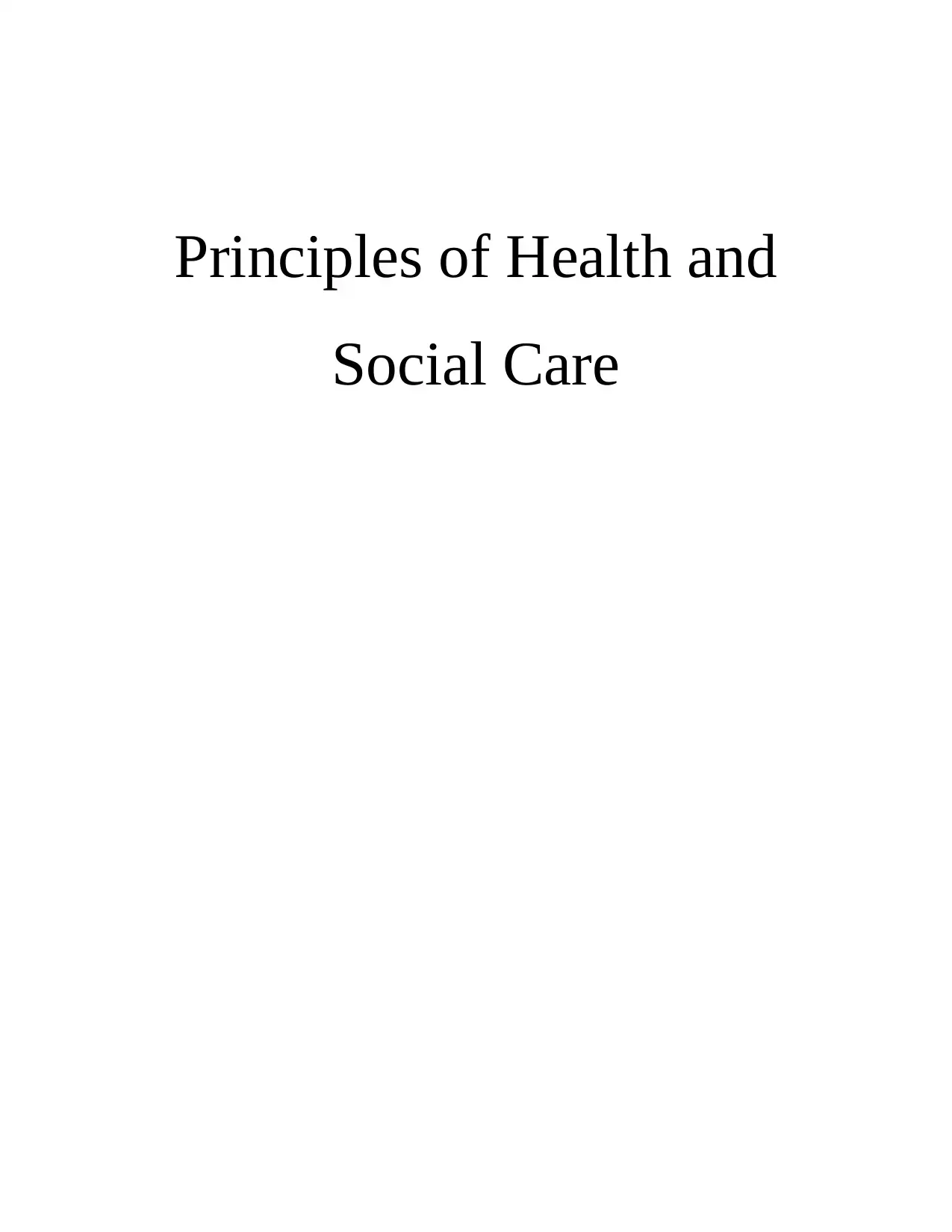
Principles of Health and
Social Care
Social Care
Paraphrase This Document
Need a fresh take? Get an instant paraphrase of this document with our AI Paraphraser
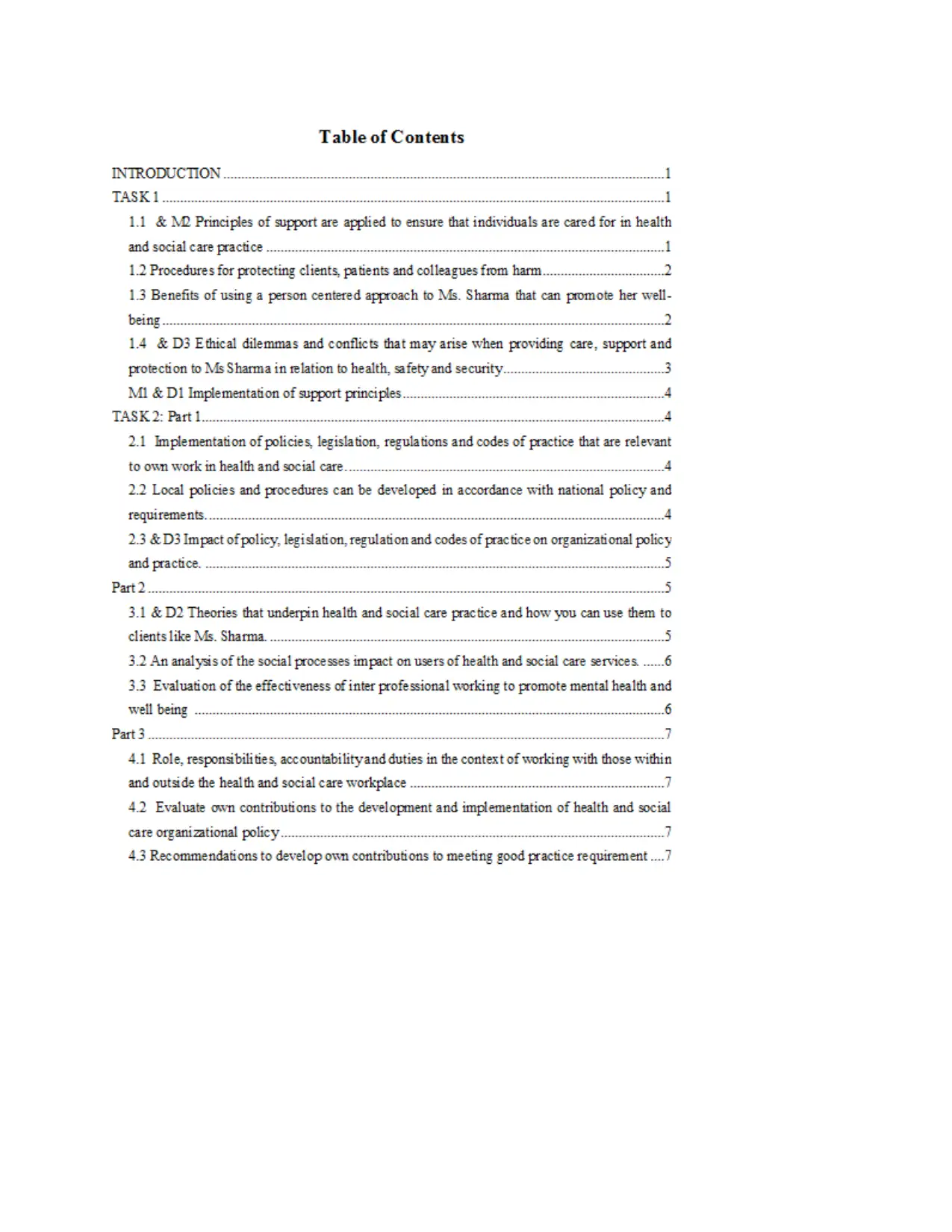
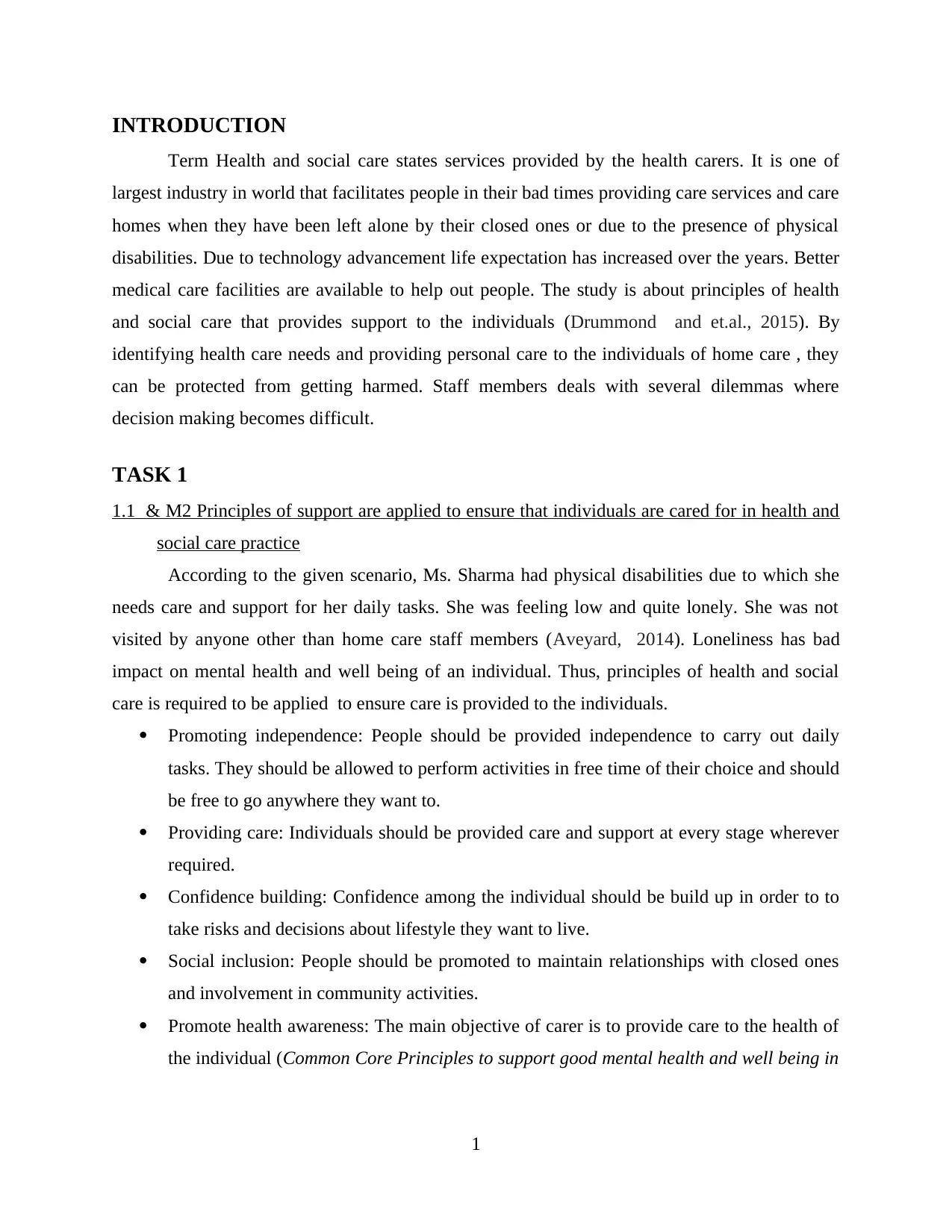
INTRODUCTION
Term Health and social care states services provided by the health carers. It is one of
largest industry in world that facilitates people in their bad times providing care services and care
homes when they have been left alone by their closed ones or due to the presence of physical
disabilities. Due to technology advancement life expectation has increased over the years. Better
medical care facilities are available to help out people. The study is about principles of health
and social care that provides support to the individuals (Drummond and et.al., 2015). By
identifying health care needs and providing personal care to the individuals of home care , they
can be protected from getting harmed. Staff members deals with several dilemmas where
decision making becomes difficult.
TASK 1
1.1 & M2 Principles of support are applied to ensure that individuals are cared for in health and
social care practice
According to the given scenario, Ms. Sharma had physical disabilities due to which she
needs care and support for her daily tasks. She was feeling low and quite lonely. She was not
visited by anyone other than home care staff members (Aveyard, 2014). Loneliness has bad
impact on mental health and well being of an individual. Thus, principles of health and social
care is required to be applied to ensure care is provided to the individuals.
Promoting independence: People should be provided independence to carry out daily
tasks. They should be allowed to perform activities in free time of their choice and should
be free to go anywhere they want to.
Providing care: Individuals should be provided care and support at every stage wherever
required.
Confidence building: Confidence among the individual should be build up in order to to
take risks and decisions about lifestyle they want to live.
Social inclusion: People should be promoted to maintain relationships with closed ones
and involvement in community activities.
Promote health awareness: The main objective of carer is to provide care to the health of
the individual (Common Core Principles to support good mental health and well being in
1
Term Health and social care states services provided by the health carers. It is one of
largest industry in world that facilitates people in their bad times providing care services and care
homes when they have been left alone by their closed ones or due to the presence of physical
disabilities. Due to technology advancement life expectation has increased over the years. Better
medical care facilities are available to help out people. The study is about principles of health
and social care that provides support to the individuals (Drummond and et.al., 2015). By
identifying health care needs and providing personal care to the individuals of home care , they
can be protected from getting harmed. Staff members deals with several dilemmas where
decision making becomes difficult.
TASK 1
1.1 & M2 Principles of support are applied to ensure that individuals are cared for in health and
social care practice
According to the given scenario, Ms. Sharma had physical disabilities due to which she
needs care and support for her daily tasks. She was feeling low and quite lonely. She was not
visited by anyone other than home care staff members (Aveyard, 2014). Loneliness has bad
impact on mental health and well being of an individual. Thus, principles of health and social
care is required to be applied to ensure care is provided to the individuals.
Promoting independence: People should be provided independence to carry out daily
tasks. They should be allowed to perform activities in free time of their choice and should
be free to go anywhere they want to.
Providing care: Individuals should be provided care and support at every stage wherever
required.
Confidence building: Confidence among the individual should be build up in order to to
take risks and decisions about lifestyle they want to live.
Social inclusion: People should be promoted to maintain relationships with closed ones
and involvement in community activities.
Promote health awareness: The main objective of carer is to provide care to the health of
the individual (Common Core Principles to support good mental health and well being in
1
⊘ This is a preview!⊘
Do you want full access?
Subscribe today to unlock all pages.

Trusted by 1+ million students worldwide
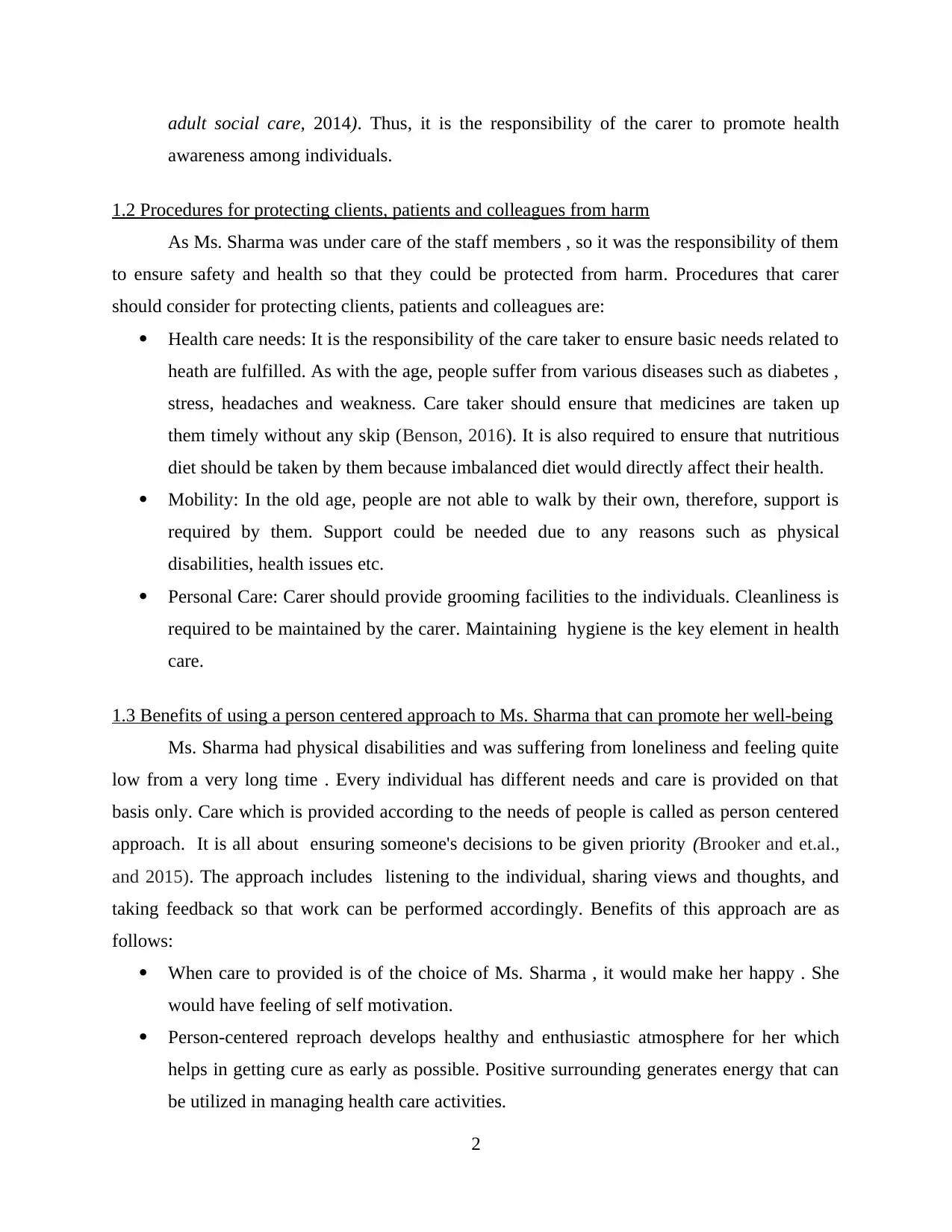
adult social care, 2014). Thus, it is the responsibility of the carer to promote health
awareness among individuals.
1.2 Procedures for protecting clients, patients and colleagues from harm
As Ms. Sharma was under care of the staff members , so it was the responsibility of them
to ensure safety and health so that they could be protected from harm. Procedures that carer
should consider for protecting clients, patients and colleagues are:
Health care needs: It is the responsibility of the care taker to ensure basic needs related to
heath are fulfilled. As with the age, people suffer from various diseases such as diabetes ,
stress, headaches and weakness. Care taker should ensure that medicines are taken up
them timely without any skip (Benson, 2016). It is also required to ensure that nutritious
diet should be taken by them because imbalanced diet would directly affect their health.
Mobility: In the old age, people are not able to walk by their own, therefore, support is
required by them. Support could be needed due to any reasons such as physical
disabilities, health issues etc.
Personal Care: Carer should provide grooming facilities to the individuals. Cleanliness is
required to be maintained by the carer. Maintaining hygiene is the key element in health
care.
1.3 Benefits of using a person centered approach to Ms. Sharma that can promote her well-being
Ms. Sharma had physical disabilities and was suffering from loneliness and feeling quite
low from a very long time . Every individual has different needs and care is provided on that
basis only. Care which is provided according to the needs of people is called as person centered
approach. It is all about ensuring someone's decisions to be given priority (Brooker and et.al.,
and 2015). The approach includes listening to the individual, sharing views and thoughts, and
taking feedback so that work can be performed accordingly. Benefits of this approach are as
follows:
When care to provided is of the choice of Ms. Sharma , it would make her happy . She
would have feeling of self motivation.
Person-centered reproach develops healthy and enthusiastic atmosphere for her which
helps in getting cure as early as possible. Positive surrounding generates energy that can
be utilized in managing health care activities.
2
awareness among individuals.
1.2 Procedures for protecting clients, patients and colleagues from harm
As Ms. Sharma was under care of the staff members , so it was the responsibility of them
to ensure safety and health so that they could be protected from harm. Procedures that carer
should consider for protecting clients, patients and colleagues are:
Health care needs: It is the responsibility of the care taker to ensure basic needs related to
heath are fulfilled. As with the age, people suffer from various diseases such as diabetes ,
stress, headaches and weakness. Care taker should ensure that medicines are taken up
them timely without any skip (Benson, 2016). It is also required to ensure that nutritious
diet should be taken by them because imbalanced diet would directly affect their health.
Mobility: In the old age, people are not able to walk by their own, therefore, support is
required by them. Support could be needed due to any reasons such as physical
disabilities, health issues etc.
Personal Care: Carer should provide grooming facilities to the individuals. Cleanliness is
required to be maintained by the carer. Maintaining hygiene is the key element in health
care.
1.3 Benefits of using a person centered approach to Ms. Sharma that can promote her well-being
Ms. Sharma had physical disabilities and was suffering from loneliness and feeling quite
low from a very long time . Every individual has different needs and care is provided on that
basis only. Care which is provided according to the needs of people is called as person centered
approach. It is all about ensuring someone's decisions to be given priority (Brooker and et.al.,
and 2015). The approach includes listening to the individual, sharing views and thoughts, and
taking feedback so that work can be performed accordingly. Benefits of this approach are as
follows:
When care to provided is of the choice of Ms. Sharma , it would make her happy . She
would have feeling of self motivation.
Person-centered reproach develops healthy and enthusiastic atmosphere for her which
helps in getting cure as early as possible. Positive surrounding generates energy that can
be utilized in managing health care activities.
2
Paraphrase This Document
Need a fresh take? Get an instant paraphrase of this document with our AI Paraphraser
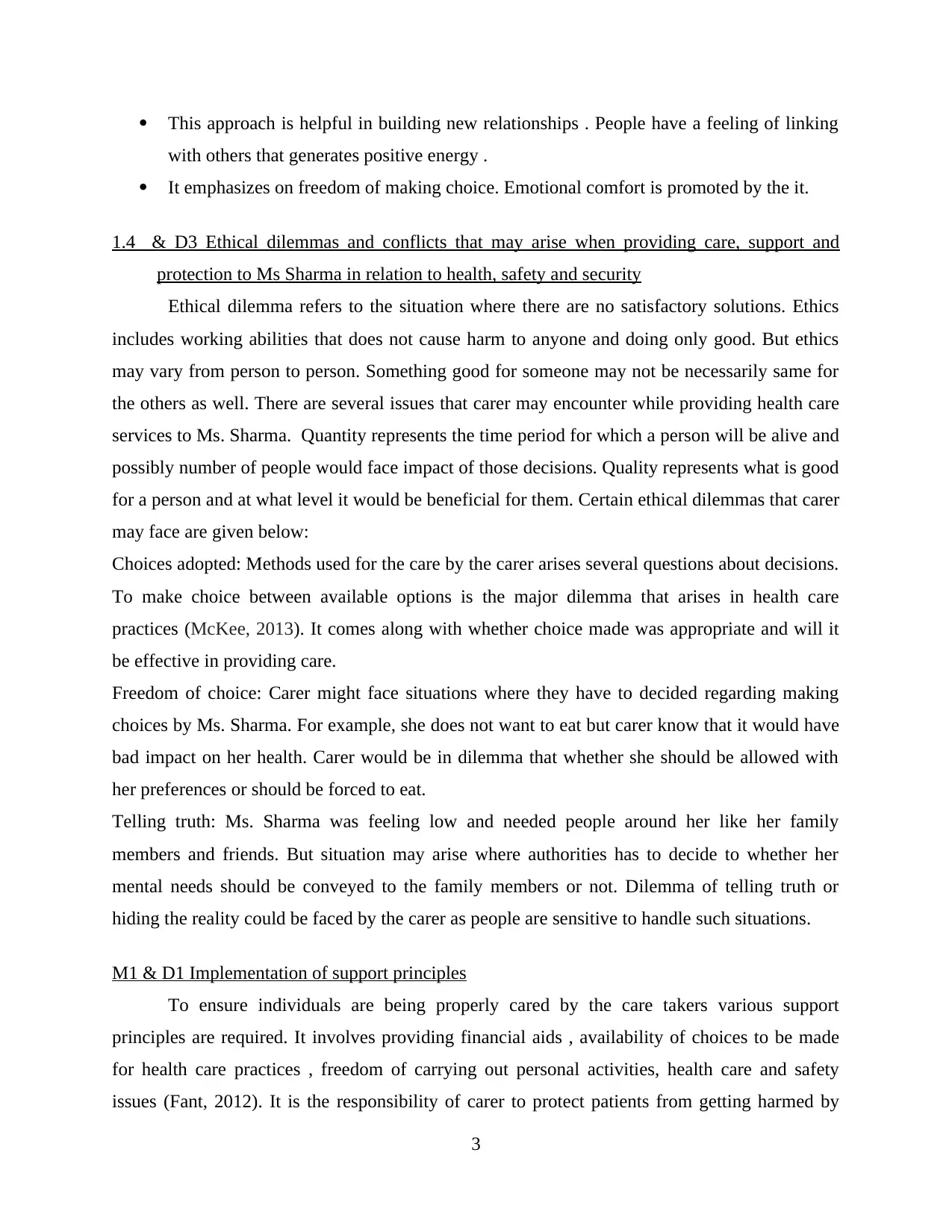
This approach is helpful in building new relationships . People have a feeling of linking
with others that generates positive energy .
It emphasizes on freedom of making choice. Emotional comfort is promoted by the it.
1.4 & D3 Ethical dilemmas and conflicts that may arise when providing care, support and
protection to Ms Sharma in relation to health, safety and security
Ethical dilemma refers to the situation where there are no satisfactory solutions. Ethics
includes working abilities that does not cause harm to anyone and doing only good. But ethics
may vary from person to person. Something good for someone may not be necessarily same for
the others as well. There are several issues that carer may encounter while providing health care
services to Ms. Sharma. Quantity represents the time period for which a person will be alive and
possibly number of people would face impact of those decisions. Quality represents what is good
for a person and at what level it would be beneficial for them. Certain ethical dilemmas that carer
may face are given below:
Choices adopted: Methods used for the care by the carer arises several questions about decisions.
To make choice between available options is the major dilemma that arises in health care
practices (McKee, 2013). It comes along with whether choice made was appropriate and will it
be effective in providing care.
Freedom of choice: Carer might face situations where they have to decided regarding making
choices by Ms. Sharma. For example, she does not want to eat but carer know that it would have
bad impact on her health. Carer would be in dilemma that whether she should be allowed with
her preferences or should be forced to eat.
Telling truth: Ms. Sharma was feeling low and needed people around her like her family
members and friends. But situation may arise where authorities has to decide to whether her
mental needs should be conveyed to the family members or not. Dilemma of telling truth or
hiding the reality could be faced by the carer as people are sensitive to handle such situations.
M1 & D1 Implementation of support principles
To ensure individuals are being properly cared by the care takers various support
principles are required. It involves providing financial aids , availability of choices to be made
for health care practices , freedom of carrying out personal activities, health care and safety
issues (Fant, 2012). It is the responsibility of carer to protect patients from getting harmed by
3
with others that generates positive energy .
It emphasizes on freedom of making choice. Emotional comfort is promoted by the it.
1.4 & D3 Ethical dilemmas and conflicts that may arise when providing care, support and
protection to Ms Sharma in relation to health, safety and security
Ethical dilemma refers to the situation where there are no satisfactory solutions. Ethics
includes working abilities that does not cause harm to anyone and doing only good. But ethics
may vary from person to person. Something good for someone may not be necessarily same for
the others as well. There are several issues that carer may encounter while providing health care
services to Ms. Sharma. Quantity represents the time period for which a person will be alive and
possibly number of people would face impact of those decisions. Quality represents what is good
for a person and at what level it would be beneficial for them. Certain ethical dilemmas that carer
may face are given below:
Choices adopted: Methods used for the care by the carer arises several questions about decisions.
To make choice between available options is the major dilemma that arises in health care
practices (McKee, 2013). It comes along with whether choice made was appropriate and will it
be effective in providing care.
Freedom of choice: Carer might face situations where they have to decided regarding making
choices by Ms. Sharma. For example, she does not want to eat but carer know that it would have
bad impact on her health. Carer would be in dilemma that whether she should be allowed with
her preferences or should be forced to eat.
Telling truth: Ms. Sharma was feeling low and needed people around her like her family
members and friends. But situation may arise where authorities has to decide to whether her
mental needs should be conveyed to the family members or not. Dilemma of telling truth or
hiding the reality could be faced by the carer as people are sensitive to handle such situations.
M1 & D1 Implementation of support principles
To ensure individuals are being properly cared by the care takers various support
principles are required. It involves providing financial aids , availability of choices to be made
for health care practices , freedom of carrying out personal activities, health care and safety
issues (Fant, 2012). It is the responsibility of carer to protect patients from getting harmed by
3
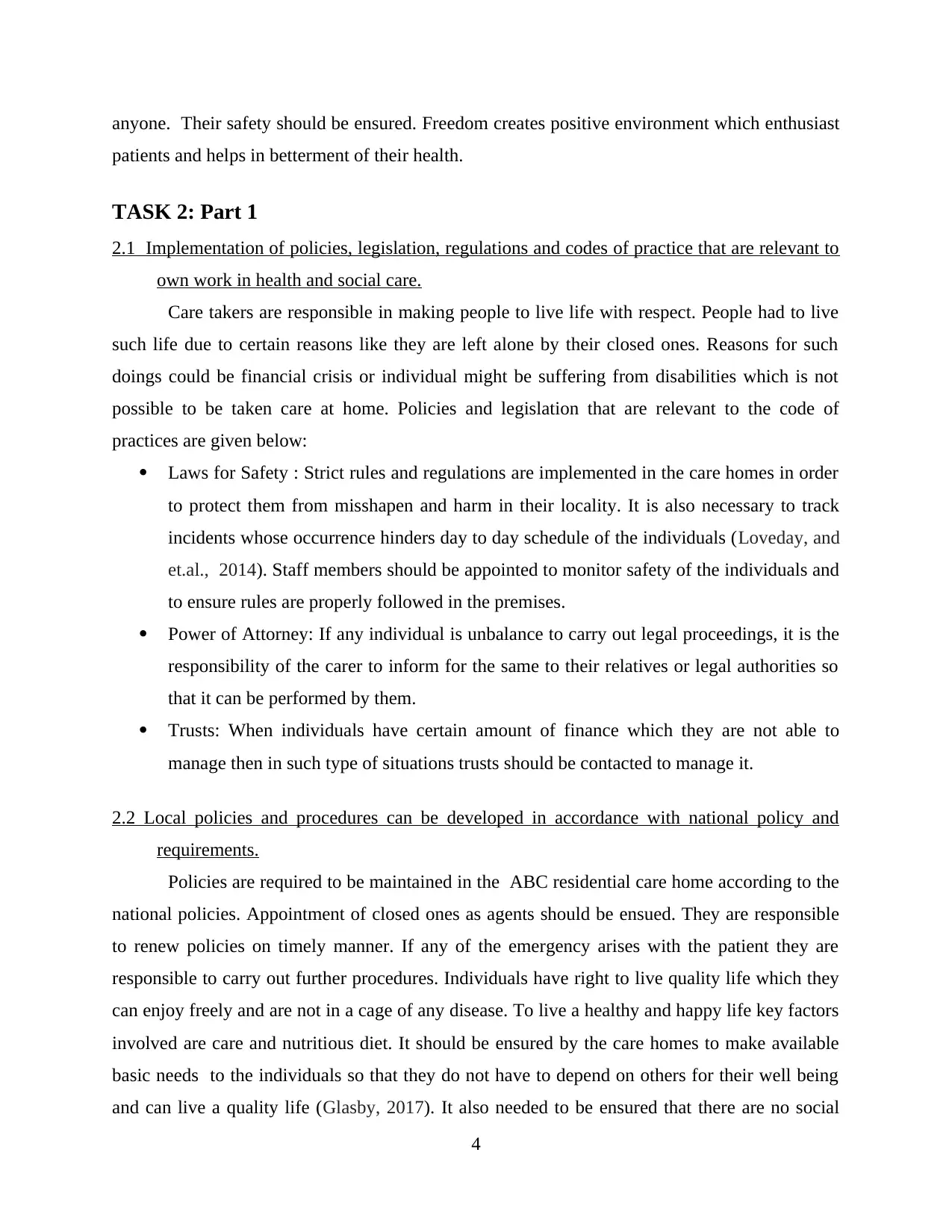
anyone. Their safety should be ensured. Freedom creates positive environment which enthusiast
patients and helps in betterment of their health.
TASK 2: Part 1
2.1 Implementation of policies, legislation, regulations and codes of practice that are relevant to
own work in health and social care.
Care takers are responsible in making people to live life with respect. People had to live
such life due to certain reasons like they are left alone by their closed ones. Reasons for such
doings could be financial crisis or individual might be suffering from disabilities which is not
possible to be taken care at home. Policies and legislation that are relevant to the code of
practices are given below:
Laws for Safety : Strict rules and regulations are implemented in the care homes in order
to protect them from misshapen and harm in their locality. It is also necessary to track
incidents whose occurrence hinders day to day schedule of the individuals (Loveday, and
et.al., 2014). Staff members should be appointed to monitor safety of the individuals and
to ensure rules are properly followed in the premises.
Power of Attorney: If any individual is unbalance to carry out legal proceedings, it is the
responsibility of the carer to inform for the same to their relatives or legal authorities so
that it can be performed by them.
Trusts: When individuals have certain amount of finance which they are not able to
manage then in such type of situations trusts should be contacted to manage it.
2.2 Local policies and procedures can be developed in accordance with national policy and
requirements.
Policies are required to be maintained in the ABC residential care home according to the
national policies. Appointment of closed ones as agents should be ensued. They are responsible
to renew policies on timely manner. If any of the emergency arises with the patient they are
responsible to carry out further procedures. Individuals have right to live quality life which they
can enjoy freely and are not in a cage of any disease. To live a healthy and happy life key factors
involved are care and nutritious diet. It should be ensured by the care homes to make available
basic needs to the individuals so that they do not have to depend on others for their well being
and can live a quality life (Glasby, 2017). It also needed to be ensured that there are no social
4
patients and helps in betterment of their health.
TASK 2: Part 1
2.1 Implementation of policies, legislation, regulations and codes of practice that are relevant to
own work in health and social care.
Care takers are responsible in making people to live life with respect. People had to live
such life due to certain reasons like they are left alone by their closed ones. Reasons for such
doings could be financial crisis or individual might be suffering from disabilities which is not
possible to be taken care at home. Policies and legislation that are relevant to the code of
practices are given below:
Laws for Safety : Strict rules and regulations are implemented in the care homes in order
to protect them from misshapen and harm in their locality. It is also necessary to track
incidents whose occurrence hinders day to day schedule of the individuals (Loveday, and
et.al., 2014). Staff members should be appointed to monitor safety of the individuals and
to ensure rules are properly followed in the premises.
Power of Attorney: If any individual is unbalance to carry out legal proceedings, it is the
responsibility of the carer to inform for the same to their relatives or legal authorities so
that it can be performed by them.
Trusts: When individuals have certain amount of finance which they are not able to
manage then in such type of situations trusts should be contacted to manage it.
2.2 Local policies and procedures can be developed in accordance with national policy and
requirements.
Policies are required to be maintained in the ABC residential care home according to the
national policies. Appointment of closed ones as agents should be ensued. They are responsible
to renew policies on timely manner. If any of the emergency arises with the patient they are
responsible to carry out further procedures. Individuals have right to live quality life which they
can enjoy freely and are not in a cage of any disease. To live a healthy and happy life key factors
involved are care and nutritious diet. It should be ensured by the care homes to make available
basic needs to the individuals so that they do not have to depend on others for their well being
and can live a quality life (Glasby, 2017). It also needed to be ensured that there are no social
4
⊘ This is a preview!⊘
Do you want full access?
Subscribe today to unlock all pages.

Trusted by 1+ million students worldwide
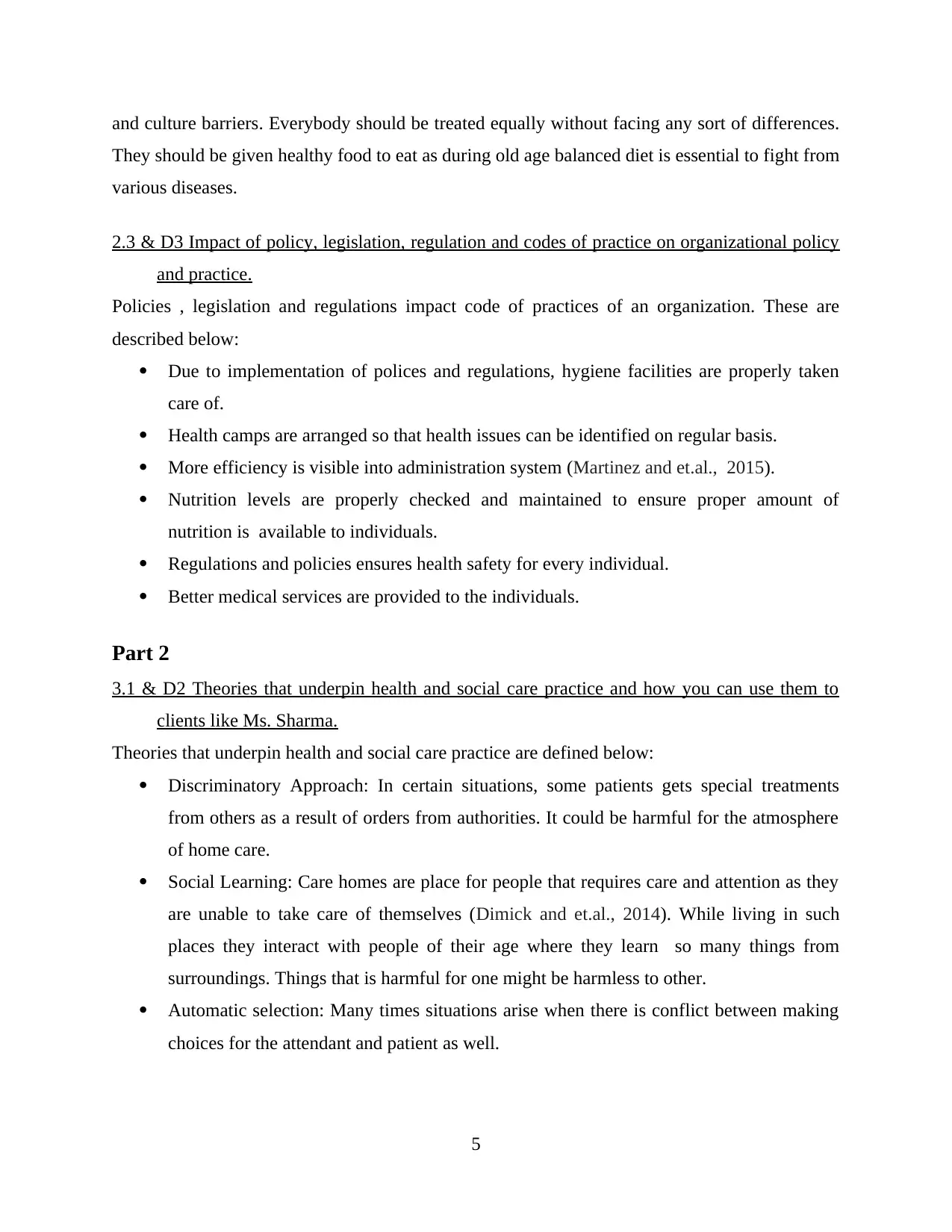
and culture barriers. Everybody should be treated equally without facing any sort of differences.
They should be given healthy food to eat as during old age balanced diet is essential to fight from
various diseases.
2.3 & D3 Impact of policy, legislation, regulation and codes of practice on organizational policy
and practice.
Policies , legislation and regulations impact code of practices of an organization. These are
described below:
Due to implementation of polices and regulations, hygiene facilities are properly taken
care of.
Health camps are arranged so that health issues can be identified on regular basis.
More efficiency is visible into administration system (Martinez and et.al., 2015).
Nutrition levels are properly checked and maintained to ensure proper amount of
nutrition is available to individuals.
Regulations and policies ensures health safety for every individual.
Better medical services are provided to the individuals.
Part 2
3.1 & D2 Theories that underpin health and social care practice and how you can use them to
clients like Ms. Sharma.
Theories that underpin health and social care practice are defined below:
Discriminatory Approach: In certain situations, some patients gets special treatments
from others as a result of orders from authorities. It could be harmful for the atmosphere
of home care.
Social Learning: Care homes are place for people that requires care and attention as they
are unable to take care of themselves (Dimick and et.al., 2014). While living in such
places they interact with people of their age where they learn so many things from
surroundings. Things that is harmful for one might be harmless to other.
Automatic selection: Many times situations arise when there is conflict between making
choices for the attendant and patient as well.
5
They should be given healthy food to eat as during old age balanced diet is essential to fight from
various diseases.
2.3 & D3 Impact of policy, legislation, regulation and codes of practice on organizational policy
and practice.
Policies , legislation and regulations impact code of practices of an organization. These are
described below:
Due to implementation of polices and regulations, hygiene facilities are properly taken
care of.
Health camps are arranged so that health issues can be identified on regular basis.
More efficiency is visible into administration system (Martinez and et.al., 2015).
Nutrition levels are properly checked and maintained to ensure proper amount of
nutrition is available to individuals.
Regulations and policies ensures health safety for every individual.
Better medical services are provided to the individuals.
Part 2
3.1 & D2 Theories that underpin health and social care practice and how you can use them to
clients like Ms. Sharma.
Theories that underpin health and social care practice are defined below:
Discriminatory Approach: In certain situations, some patients gets special treatments
from others as a result of orders from authorities. It could be harmful for the atmosphere
of home care.
Social Learning: Care homes are place for people that requires care and attention as they
are unable to take care of themselves (Dimick and et.al., 2014). While living in such
places they interact with people of their age where they learn so many things from
surroundings. Things that is harmful for one might be harmless to other.
Automatic selection: Many times situations arise when there is conflict between making
choices for the attendant and patient as well.
5
Paraphrase This Document
Need a fresh take? Get an instant paraphrase of this document with our AI Paraphraser
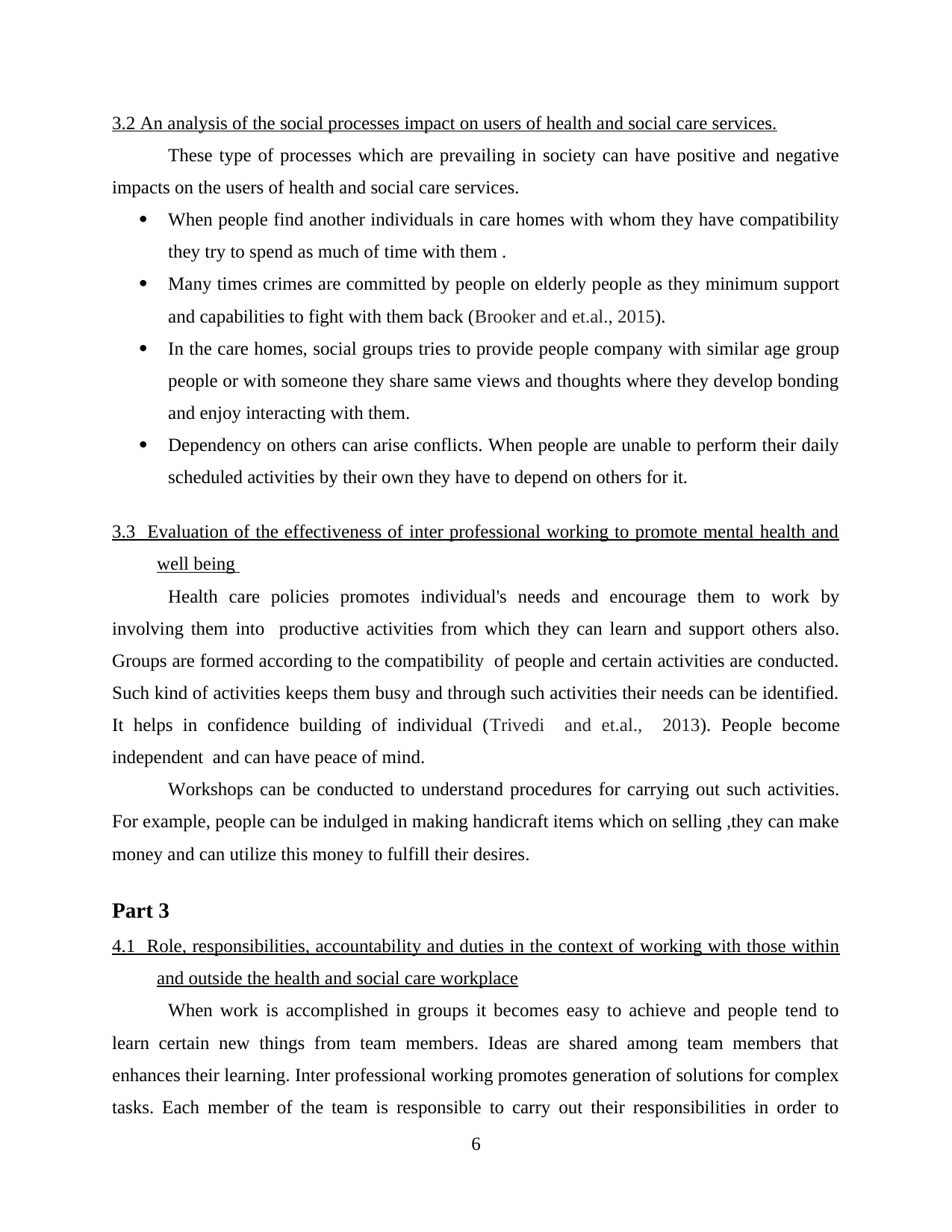
3.2 An analysis of the social processes impact on users of health and social care services.
These type of processes which are prevailing in society can have positive and negative
impacts on the users of health and social care services.
When people find another individuals in care homes with whom they have compatibility
they try to spend as much of time with them .
Many times crimes are committed by people on elderly people as they minimum support
and capabilities to fight with them back (Brooker and et.al., 2015).
In the care homes, social groups tries to provide people company with similar age group
people or with someone they share same views and thoughts where they develop bonding
and enjoy interacting with them.
Dependency on others can arise conflicts. When people are unable to perform their daily
scheduled activities by their own they have to depend on others for it.
3.3 Evaluation of the effectiveness of inter professional working to promote mental health and
well being
Health care policies promotes individual's needs and encourage them to work by
involving them into productive activities from which they can learn and support others also.
Groups are formed according to the compatibility of people and certain activities are conducted.
Such kind of activities keeps them busy and through such activities their needs can be identified.
It helps in confidence building of individual (Trivedi and et.al., 2013). People become
independent and can have peace of mind.
Workshops can be conducted to understand procedures for carrying out such activities.
For example, people can be indulged in making handicraft items which on selling ,they can make
money and can utilize this money to fulfill their desires.
Part 3
4.1 Role, responsibilities, accountability and duties in the context of working with those within
and outside the health and social care workplace
When work is accomplished in groups it becomes easy to achieve and people tend to
learn certain new things from team members. Ideas are shared among team members that
enhances their learning. Inter professional working promotes generation of solutions for complex
tasks. Each member of the team is responsible to carry out their responsibilities in order to
6
These type of processes which are prevailing in society can have positive and negative
impacts on the users of health and social care services.
When people find another individuals in care homes with whom they have compatibility
they try to spend as much of time with them .
Many times crimes are committed by people on elderly people as they minimum support
and capabilities to fight with them back (Brooker and et.al., 2015).
In the care homes, social groups tries to provide people company with similar age group
people or with someone they share same views and thoughts where they develop bonding
and enjoy interacting with them.
Dependency on others can arise conflicts. When people are unable to perform their daily
scheduled activities by their own they have to depend on others for it.
3.3 Evaluation of the effectiveness of inter professional working to promote mental health and
well being
Health care policies promotes individual's needs and encourage them to work by
involving them into productive activities from which they can learn and support others also.
Groups are formed according to the compatibility of people and certain activities are conducted.
Such kind of activities keeps them busy and through such activities their needs can be identified.
It helps in confidence building of individual (Trivedi and et.al., 2013). People become
independent and can have peace of mind.
Workshops can be conducted to understand procedures for carrying out such activities.
For example, people can be indulged in making handicraft items which on selling ,they can make
money and can utilize this money to fulfill their desires.
Part 3
4.1 Role, responsibilities, accountability and duties in the context of working with those within
and outside the health and social care workplace
When work is accomplished in groups it becomes easy to achieve and people tend to
learn certain new things from team members. Ideas are shared among team members that
enhances their learning. Inter professional working promotes generation of solutions for complex
tasks. Each member of the team is responsible to carry out their responsibilities in order to
6
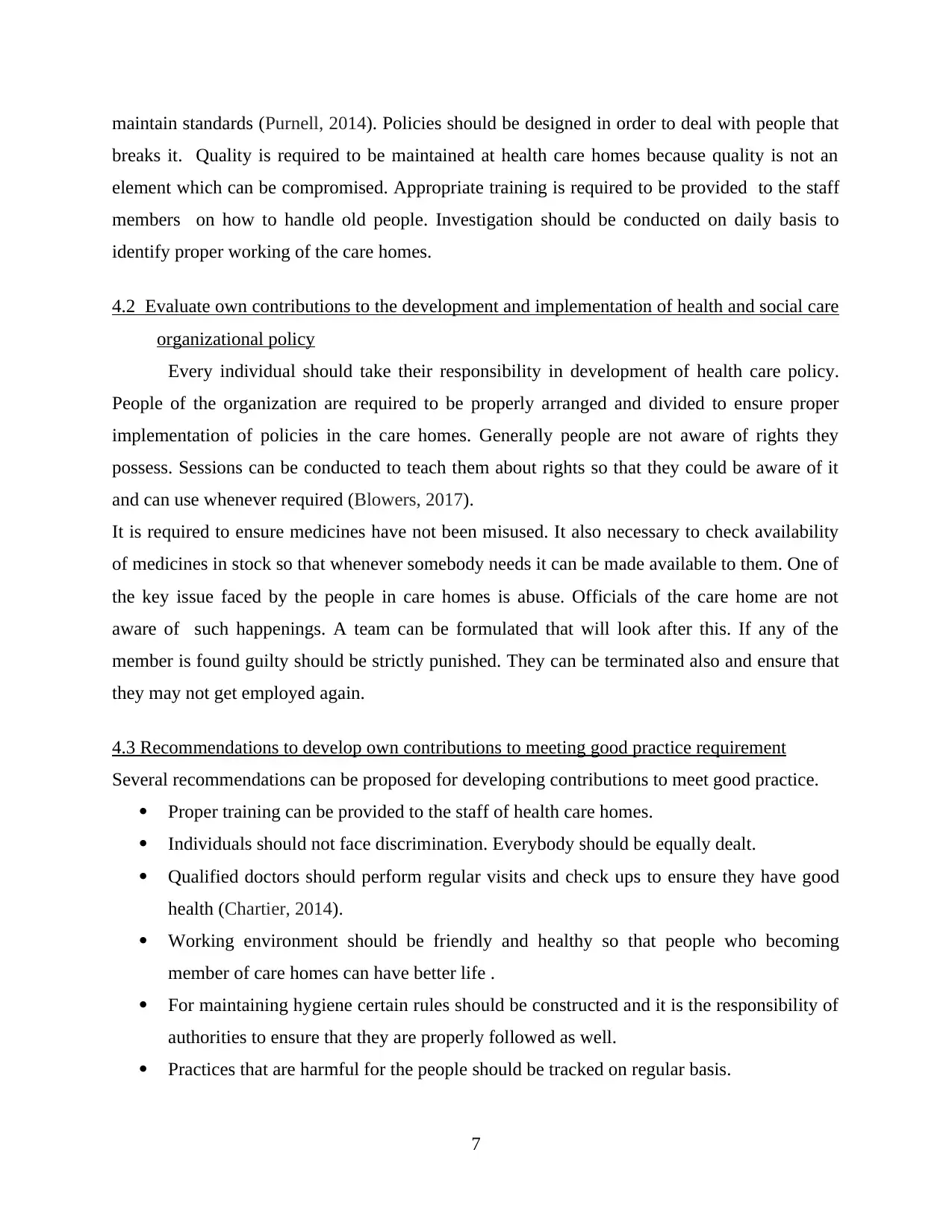
maintain standards (Purnell, 2014). Policies should be designed in order to deal with people that
breaks it. Quality is required to be maintained at health care homes because quality is not an
element which can be compromised. Appropriate training is required to be provided to the staff
members on how to handle old people. Investigation should be conducted on daily basis to
identify proper working of the care homes.
4.2 Evaluate own contributions to the development and implementation of health and social care
organizational policy
Every individual should take their responsibility in development of health care policy.
People of the organization are required to be properly arranged and divided to ensure proper
implementation of policies in the care homes. Generally people are not aware of rights they
possess. Sessions can be conducted to teach them about rights so that they could be aware of it
and can use whenever required (Blowers, 2017).
It is required to ensure medicines have not been misused. It also necessary to check availability
of medicines in stock so that whenever somebody needs it can be made available to them. One of
the key issue faced by the people in care homes is abuse. Officials of the care home are not
aware of such happenings. A team can be formulated that will look after this. If any of the
member is found guilty should be strictly punished. They can be terminated also and ensure that
they may not get employed again.
4.3 Recommendations to develop own contributions to meeting good practice requirement
Several recommendations can be proposed for developing contributions to meet good practice.
Proper training can be provided to the staff of health care homes.
Individuals should not face discrimination. Everybody should be equally dealt.
Qualified doctors should perform regular visits and check ups to ensure they have good
health (Chartier, 2014).
Working environment should be friendly and healthy so that people who becoming
member of care homes can have better life .
For maintaining hygiene certain rules should be constructed and it is the responsibility of
authorities to ensure that they are properly followed as well.
Practices that are harmful for the people should be tracked on regular basis.
7
breaks it. Quality is required to be maintained at health care homes because quality is not an
element which can be compromised. Appropriate training is required to be provided to the staff
members on how to handle old people. Investigation should be conducted on daily basis to
identify proper working of the care homes.
4.2 Evaluate own contributions to the development and implementation of health and social care
organizational policy
Every individual should take their responsibility in development of health care policy.
People of the organization are required to be properly arranged and divided to ensure proper
implementation of policies in the care homes. Generally people are not aware of rights they
possess. Sessions can be conducted to teach them about rights so that they could be aware of it
and can use whenever required (Blowers, 2017).
It is required to ensure medicines have not been misused. It also necessary to check availability
of medicines in stock so that whenever somebody needs it can be made available to them. One of
the key issue faced by the people in care homes is abuse. Officials of the care home are not
aware of such happenings. A team can be formulated that will look after this. If any of the
member is found guilty should be strictly punished. They can be terminated also and ensure that
they may not get employed again.
4.3 Recommendations to develop own contributions to meeting good practice requirement
Several recommendations can be proposed for developing contributions to meet good practice.
Proper training can be provided to the staff of health care homes.
Individuals should not face discrimination. Everybody should be equally dealt.
Qualified doctors should perform regular visits and check ups to ensure they have good
health (Chartier, 2014).
Working environment should be friendly and healthy so that people who becoming
member of care homes can have better life .
For maintaining hygiene certain rules should be constructed and it is the responsibility of
authorities to ensure that they are properly followed as well.
Practices that are harmful for the people should be tracked on regular basis.
7
⊘ This is a preview!⊘
Do you want full access?
Subscribe today to unlock all pages.

Trusted by 1+ million students worldwide
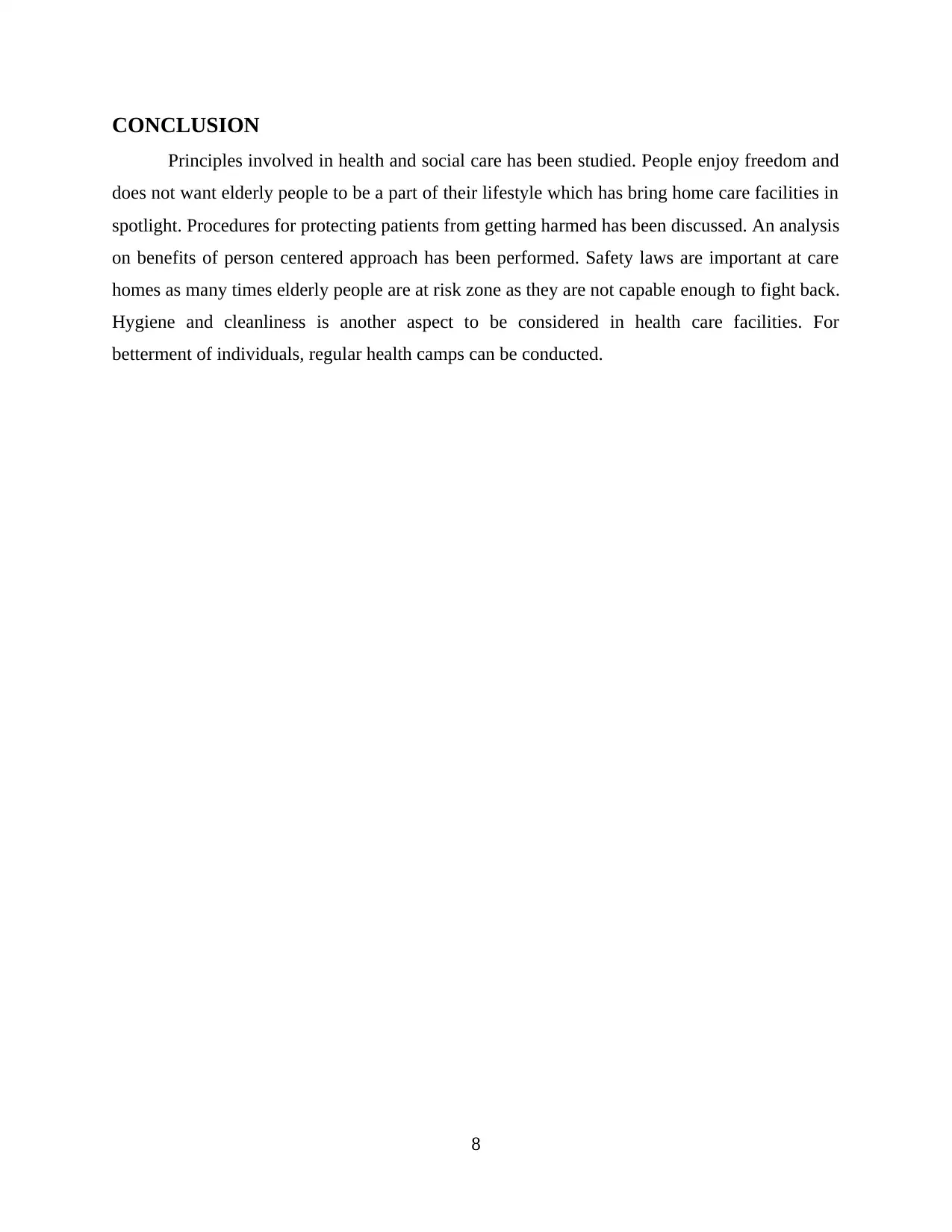
CONCLUSION
Principles involved in health and social care has been studied. People enjoy freedom and
does not want elderly people to be a part of their lifestyle which has bring home care facilities in
spotlight. Procedures for protecting patients from getting harmed has been discussed. An analysis
on benefits of person centered approach has been performed. Safety laws are important at care
homes as many times elderly people are at risk zone as they are not capable enough to fight back.
Hygiene and cleanliness is another aspect to be considered in health care facilities. For
betterment of individuals, regular health camps can be conducted.
8
Principles involved in health and social care has been studied. People enjoy freedom and
does not want elderly people to be a part of their lifestyle which has bring home care facilities in
spotlight. Procedures for protecting patients from getting harmed has been discussed. An analysis
on benefits of person centered approach has been performed. Safety laws are important at care
homes as many times elderly people are at risk zone as they are not capable enough to fight back.
Hygiene and cleanliness is another aspect to be considered in health care facilities. For
betterment of individuals, regular health camps can be conducted.
8
Paraphrase This Document
Need a fresh take? Get an instant paraphrase of this document with our AI Paraphraser
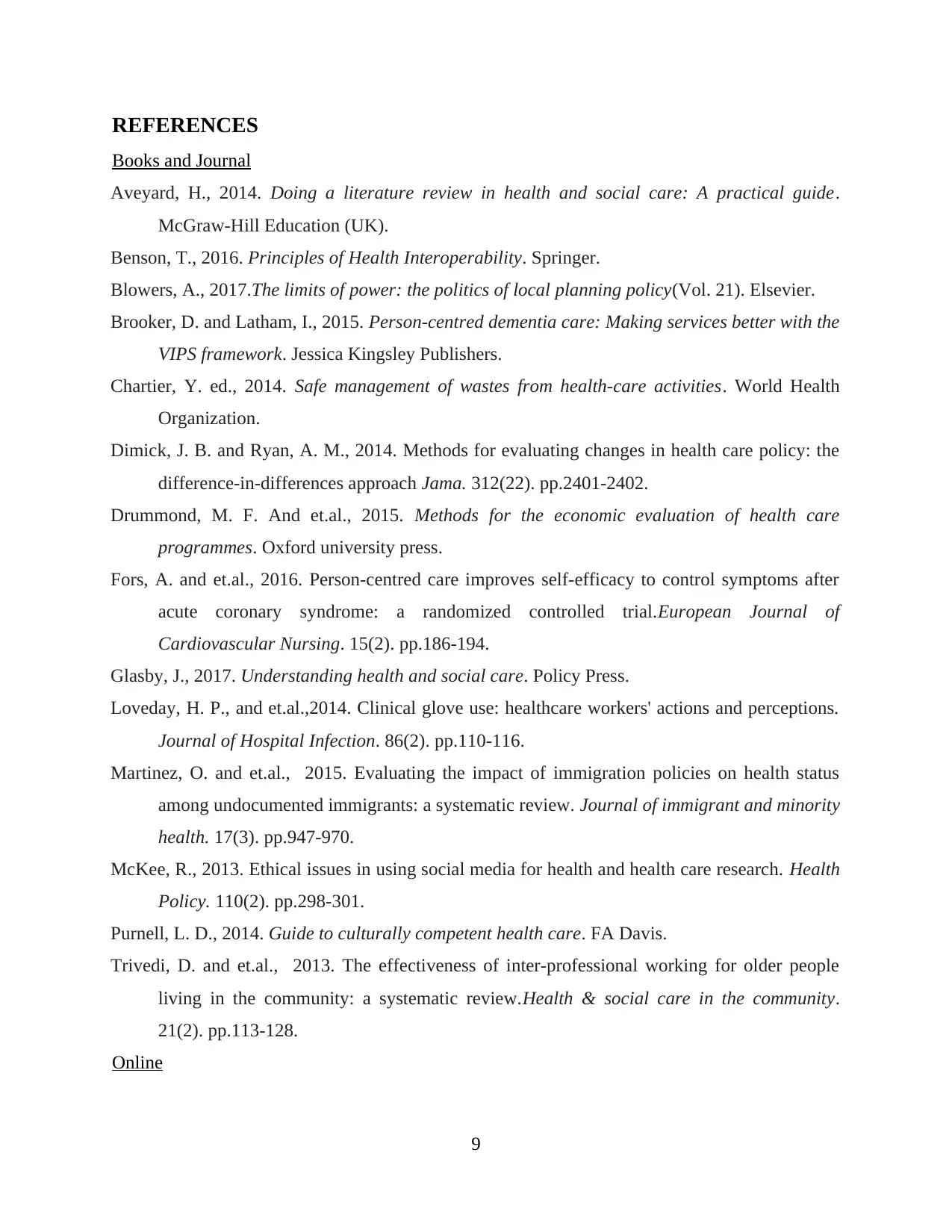
REFERENCES
Books and Journal
Aveyard, H., 2014. Doing a literature review in health and social care: A practical guide.
McGraw-Hill Education (UK).
Benson, T., 2016. Principles of Health Interoperability. Springer.
Blowers, A., 2017.The limits of power: the politics of local planning policy(Vol. 21). Elsevier.
Brooker, D. and Latham, I., 2015. Person-centred dementia care: Making services better with the
VIPS framework. Jessica Kingsley Publishers.
Chartier, Y. ed., 2014. Safe management of wastes from health-care activities. World Health
Organization.
Dimick, J. B. and Ryan, A. M., 2014. Methods for evaluating changes in health care policy: the
difference-in-differences approach Jama. 312(22). pp.2401-2402.
Drummond, M. F. And et.al., 2015. Methods for the economic evaluation of health care
programmes. Oxford university press.
Fors, A. and et.al., 2016. Person-centred care improves self-efficacy to control symptoms after
acute coronary syndrome: a randomized controlled trial.European Journal of
Cardiovascular Nursing. 15(2). pp.186-194.
Glasby, J., 2017. Understanding health and social care. Policy Press.
Loveday, H. P., and et.al.,2014. Clinical glove use: healthcare workers' actions and perceptions.
Journal of Hospital Infection. 86(2). pp.110-116.
Martinez, O. and et.al., 2015. Evaluating the impact of immigration policies on health status
among undocumented immigrants: a systematic review. Journal of immigrant and minority
health. 17(3). pp.947-970.
McKee, R., 2013. Ethical issues in using social media for health and health care research. Health
Policy. 110(2). pp.298-301.
Purnell, L. D., 2014. Guide to culturally competent health care. FA Davis.
Trivedi, D. and et.al., 2013. The effectiveness of inter‐professional working for older people
living in the community: a systematic review.Health & social care in the community.
21(2). pp.113-128.
Online
9
Books and Journal
Aveyard, H., 2014. Doing a literature review in health and social care: A practical guide.
McGraw-Hill Education (UK).
Benson, T., 2016. Principles of Health Interoperability. Springer.
Blowers, A., 2017.The limits of power: the politics of local planning policy(Vol. 21). Elsevier.
Brooker, D. and Latham, I., 2015. Person-centred dementia care: Making services better with the
VIPS framework. Jessica Kingsley Publishers.
Chartier, Y. ed., 2014. Safe management of wastes from health-care activities. World Health
Organization.
Dimick, J. B. and Ryan, A. M., 2014. Methods for evaluating changes in health care policy: the
difference-in-differences approach Jama. 312(22). pp.2401-2402.
Drummond, M. F. And et.al., 2015. Methods for the economic evaluation of health care
programmes. Oxford university press.
Fors, A. and et.al., 2016. Person-centred care improves self-efficacy to control symptoms after
acute coronary syndrome: a randomized controlled trial.European Journal of
Cardiovascular Nursing. 15(2). pp.186-194.
Glasby, J., 2017. Understanding health and social care. Policy Press.
Loveday, H. P., and et.al.,2014. Clinical glove use: healthcare workers' actions and perceptions.
Journal of Hospital Infection. 86(2). pp.110-116.
Martinez, O. and et.al., 2015. Evaluating the impact of immigration policies on health status
among undocumented immigrants: a systematic review. Journal of immigrant and minority
health. 17(3). pp.947-970.
McKee, R., 2013. Ethical issues in using social media for health and health care research. Health
Policy. 110(2). pp.298-301.
Purnell, L. D., 2014. Guide to culturally competent health care. FA Davis.
Trivedi, D. and et.al., 2013. The effectiveness of inter‐professional working for older people
living in the community: a systematic review.Health & social care in the community.
21(2). pp.113-128.
Online
9
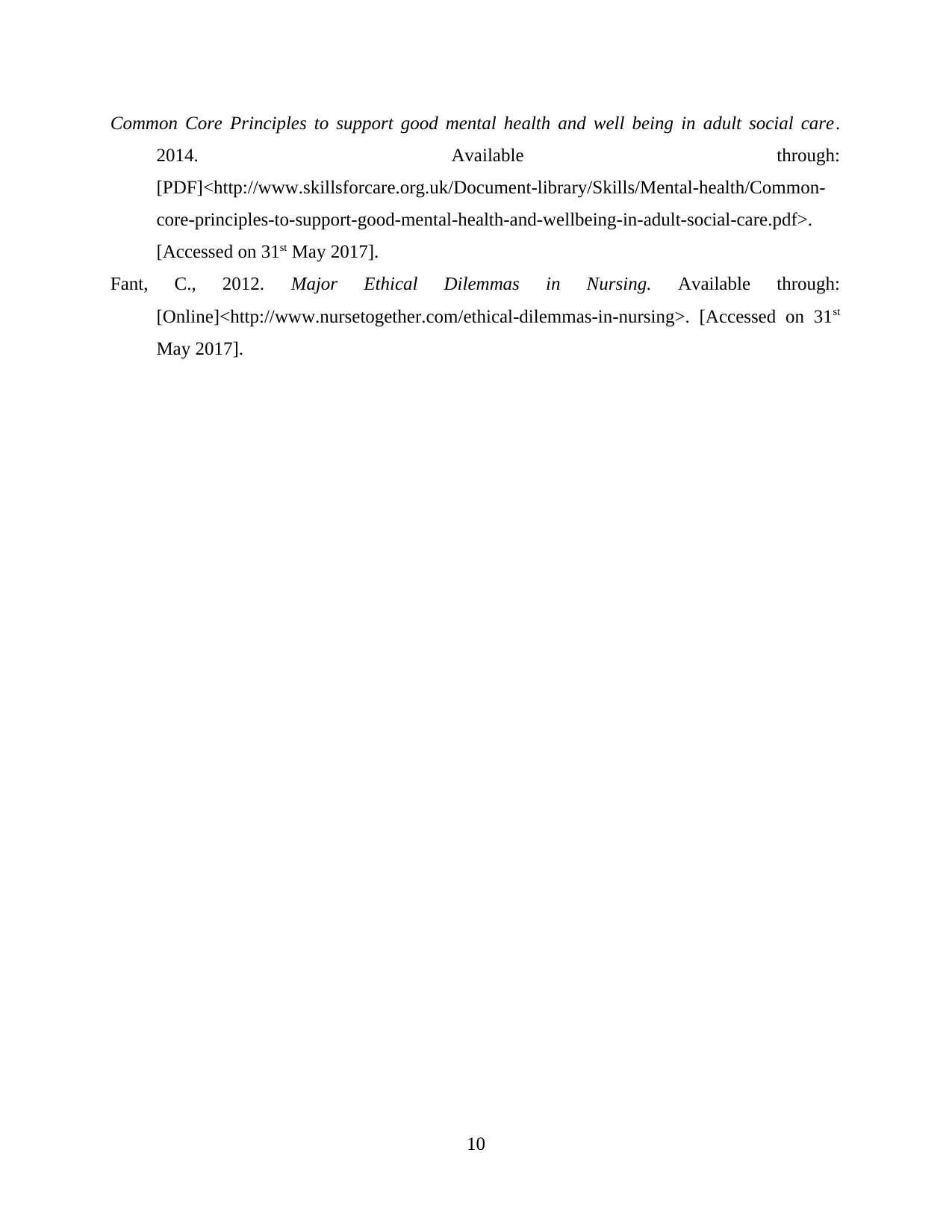
Common Core Principles to support good mental health and well being in adult social care.
2014. Available through:
[PDF]<http://www.skillsforcare.org.uk/Document-library/Skills/Mental-health/Common-
core-principles-to-support-good-mental-health-and-wellbeing-in-adult-social-care.pdf>.
[Accessed on 31st May 2017].
Fant, C., 2012. Major Ethical Dilemmas in Nursing. Available through:
[Online]<http://www.nursetogether.com/ethical-dilemmas-in-nursing>. [Accessed on 31st
May 2017].
10
2014. Available through:
[PDF]<http://www.skillsforcare.org.uk/Document-library/Skills/Mental-health/Common-
core-principles-to-support-good-mental-health-and-wellbeing-in-adult-social-care.pdf>.
[Accessed on 31st May 2017].
Fant, C., 2012. Major Ethical Dilemmas in Nursing. Available through:
[Online]<http://www.nursetogether.com/ethical-dilemmas-in-nursing>. [Accessed on 31st
May 2017].
10
⊘ This is a preview!⊘
Do you want full access?
Subscribe today to unlock all pages.

Trusted by 1+ million students worldwide
1 out of 12
Related Documents
Your All-in-One AI-Powered Toolkit for Academic Success.
+13062052269
info@desklib.com
Available 24*7 on WhatsApp / Email
![[object Object]](/_next/static/media/star-bottom.7253800d.svg)
Unlock your academic potential
Copyright © 2020–2026 A2Z Services. All Rights Reserved. Developed and managed by ZUCOL.





